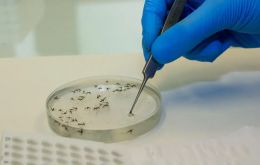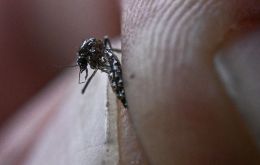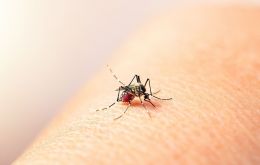MercoPress. South Atlantic News Agency
Tag: dengue
-
Monday, October 6th 2025 - 09:16 UTC
Brazil: Mosquito factory hopes to solve dengue crisis

A mosquito manufacturing factory in Campinas, in the Brazilian State of São Paulo, is relying on two new complementary technologies to reduce dengue transmission by tackling the Aedes aegypti populations.
-
Tuesday, July 22nd 2025 - 10:00 UTC
Brazilian scientists launch mosquito factory to fight dengue

Brazilian researchers launched the world's largest mosquito biofactory to target the kind that spreads dengue fever and other maladies. The Paraná Institute of Molecular Biology (IBMP) and the World Mosquito Program (WMP) inaugurated Wolbito do Brasil in breeding Aedes aegypti mosquitoes inoculated with Wolbachia bacteria, which prevents the development of viruses that cause diseases.
-
Wednesday, April 16th 2025 - 09:41 UTC
Brazil's Avisa okays Butantan's chikungunya vaccine

Brazil's National Health Surveillance Agency (Anvisa) Tuesday approved the first vaccine against chikungunya, a viral disease transmitted by the Aedes aegypti mosquito, which also spreads dengue and Zika.
-
Monday, March 24th 2025 - 20:12 UTC
Uruguay reports first autochthonous case of dengue

Uruguayan health authorities Monday confirmed the first autochthonous case of dengue this year. It was a patient in Montevideo, whose appearance triggered a full-scale deployment of epidemiology teams to track down the Aedes aegypti mosquito, the disease's vector. Montevideo City Hall teams also tested neighbors of the affected person in a move to curtail spreading.
-
Friday, March 21st 2025 - 18:49 UTC
Argentine province of Santa Fe on alert as number of dengue cases soars

The Argentine province of Santa Fe Friday reported a significant rise in dengue cases, with 598 confirmed, including 563 autochthonous, 25 imported (with patients having a travel history to places such as India, Maldives, Colombia, Brazil, and other provinces of Argentina), and 10 under investigation.
-
Thursday, February 20th 2025 - 10:46 UTC
São Paulo: Public health emergency decreed due to dengue fever

The Brazilian State of São Paulo Wednesday declared a public emergency due to the persistence and worsening of the dengue epidemic, Health Secretary Eleuses Paiva announced from the Butantan Institute.
-
Saturday, February 15th 2025 - 10:49 UTC
Brazil expands target population for dengue vax amid poor response

Brazilian Health Authorities widened the age range of potential recipients of the dengue vaccine as many doses were approaching their expiration date. The move seeks that every dose purchased reaches the population, it was explained. In addition, some batches of the drug could also be delivered to locations previously not covered by the immunization Unified Health System (SUS) programs.
-
Tuesday, February 11th 2025 - 10:11 UTC
PAHO warns of outbrreak of dengue DENV-3 serotype

The Pan American Health Organization (PAHO) Monday issued an epidemiological alert given the growing circulation of a different of dengue in the region. Cases of the DENV-3 serotype have been repported to be on the rise in Brazil, Colombia, Costa Rica, Guatemala, Mexico, and Peru.
-
Friday, January 31st 2025 - 09:40 UTC
Dengue epidemic reported in Ecuador

Ecuador's Health Ministry confirmed Thursday that the South American country was going through a dengue epidemic. Surveillance, Prevention, and Epidemiological Control Undersecretary Teresa Aumala made the announcement during a virtual press conference after 2 deaths and over 4,500 cases were recorded.
-
Monday, December 2nd 2024 - 22:14 UTC
Paraguay confirms first dengue casualty this epidemiological season

Paraguayan authorities confirmed Monday the first casualty in this dengue epidemiological season spanning from September to mid-July: It was an adult male who died last week in the department of Guairá. Health Surveillance Director Andrea Ojeda admitted that this season started late (in November) compared to previous onsets.
